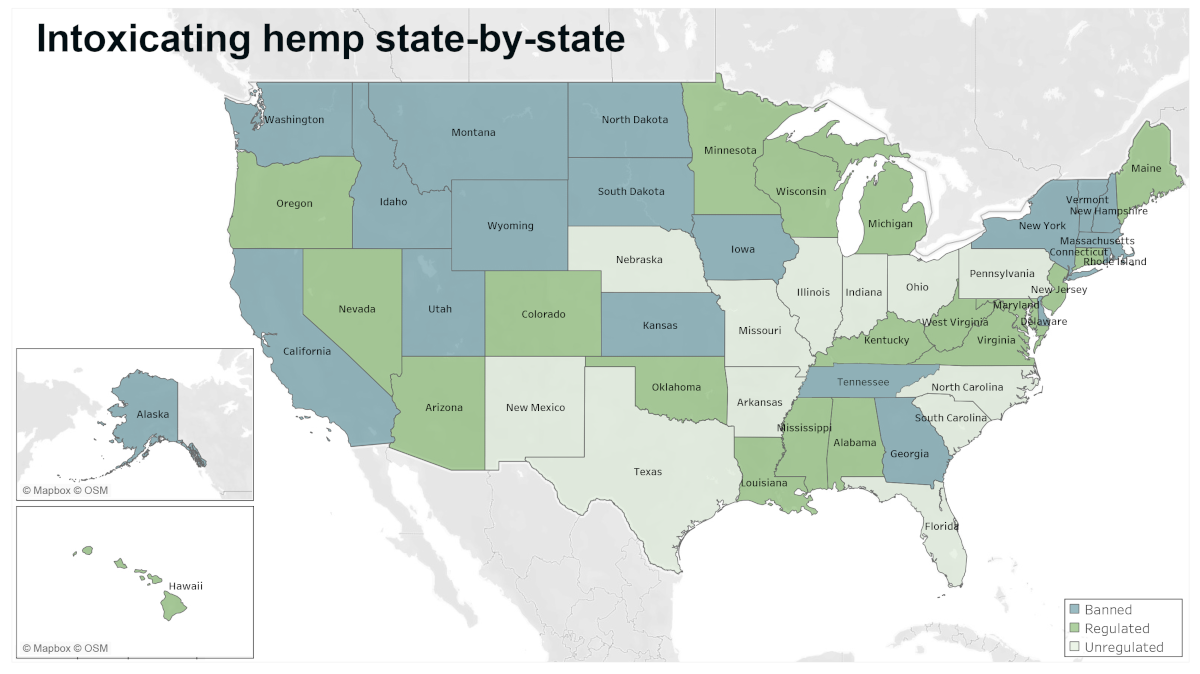With the 2023 Farm Bill delayed yet again—this time extended through Sept. 30, 2025—the most urgent regulatory crisis in the U.S. hemp sector remains unresolved. How much longer will intoxicating hemp-derived products like delta-8 THC continue to define the public perception of hemp, roil legitimate markets, and leave state lawmakers scrambling? And how much longer will those products dominate the headlines while fiber, food, and regenerative innovations fight for attention?
The Farm Bill, formally the Fiscal Year 2025 Agriculture, Rural Development, Food and Drug Administration, and Related Agencies Appropriations Act, could bring a moment of reckoning—a chance to bring order to a deeply fractured policy landscape. But with political gridlock in Congress and no guarantee that the bill will pass before the new September deadline, the uncertainty facing hemp stakeholders may stretch well into 2026.
No clear map
In the absence of federal clarity, states are moving fast—and in wildly different directions. California implemented emergency rules this spring banning hemp products with any detectable THC, even if non-intoxicating. Texas has advanced legislation that would prohibit the sale of any consumable hemp product containing delta-8 or delta-9 THC outside the state’s regulated marijuana market. Mississippi, Wisconsin, South Carolina and others are also tightening controls.
Download: Legal and regulatory status of intoxicating hemp, state-by-state
The regulatory chaos has real consequences. Responsible hemp operators—those working in food, fiber, and construction—are watching in dismay as the hemp label becomes synonymous with synthetic psychoactives sold in gas stations, vape shops and online stores with no age checks, no quality controls, and no clear labeling.
The source of the confusion: the 2018 Farm Bill legalized hemp and its derivatives, provided they contain less than 0.3% delta-9 THC. But it failed to anticipate the conversion of CBD into intoxicating compounds like delta-8, THC-O, and HHC. Exploiting this loophole, a wave of companies has flooded the market with lab-altered substances that walk and talk like cannabis—without having to abide by state cannabis rules.
Adult use
There’s a growing consensus among public health officials, regulators and many in the hemp sector: these products do not belong in convenience stores, corner markets, or online shopping carts aimed at teenagers. If consumers want to use them, fine—let them be sold in licensed cannabis dispensaries, where labeling, age restrictions, and testing protocols already exist. Let them compete as recreational products under adult-use laws.
But the continued presence of intoxicating hemp products in unregulated retail channels not only puts consumers at risk—it threatens the viability of the entire hemp industry.
Delayed fix or missed chance?
The House version of the Farm Bill includes provisions to address the problem. The most notable is the Miller Amendment, introduced by Rep. Mary Miller, R-Ill., which would redefine legal hemp to include only naturally occurring, non-intoxicating cannabinoids, effectively outlawing lab-created substances like delta-8 THC and its analogues.
It’s a blunt instrument—and critics warn it could wipe out large portions of the legitimate CBD market, especially full-spectrum extracts with trace THC. But it has also sparked overdue debate. Draft language from the House also proposes splitting hemp into two legal categories: “industrial hemp” for fiber, grain, and research, and “hemp for cannabinoid extraction,” creating a legal distinction that advocates say is essential to restoring public and investor trust.
Yet the timeline for action remains uncertain. Though the 2018 Farm Bill was extended to September 30, that is not a hard deadline. Congress could—and likely will—kick the can further into late 2025 or 2026 if fights over nutrition program funding, climate initiatives, and cannabis-related amendments remain unresolved. Senate language on intoxicating cannabinoids hasn’t even been released.
Collateral damage
In the meantime, fiber innovators, bio-based construction firms, and regenerative ag projects are being eclipsed by a policy fight they didn’t start and don’t benefit from. Public funding for smaller hemp programs—including organic certification and research—is caught in the crossfire. And entrepreneurs trying to build the kind of agricultural and industrial markets the 2018 bill originally promised now operate under a cloud of reputational and regulatory risk.
The real cost of delay isn’t just political. It’s a lost opportunity to re-establish hemp as a sustainable crop with broad benefits for food, health, and the environment.
A narrowing window
The 2023 Farm Bill still holds the potential to draw a bright line between intoxicating products and the rest of the hemp sector. But every month of delay allows that line to blur further—and allows the wrong narrative to lead.
Until Congress acts, intoxicating cannabinoids will continue to drive the hemp news cycle, dominate consumer perception, and force states to improvise. It’s time for federal lawmakers to restore clarity, sanity, and credibility—before the word “hemp” becomes permanently misunderstood.
In the absence of federal clarity, states are moving fast—and in wildly different directions. Read More


